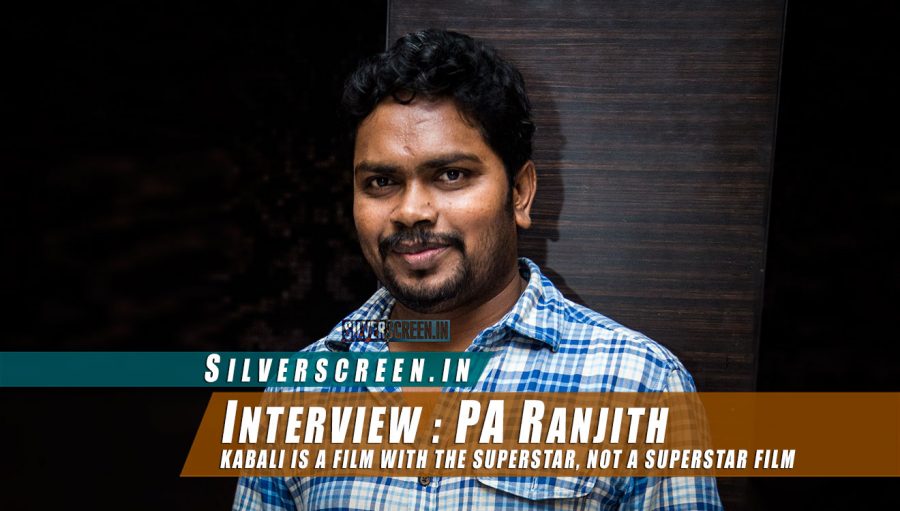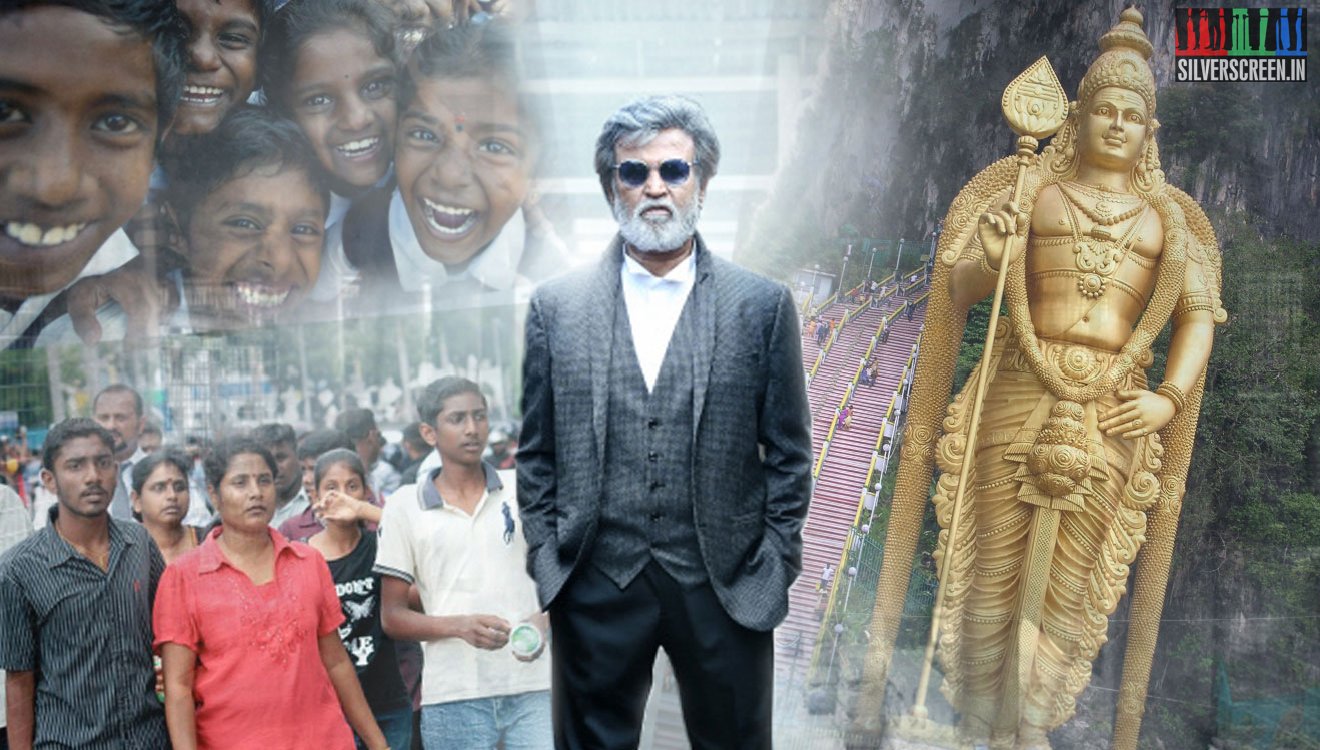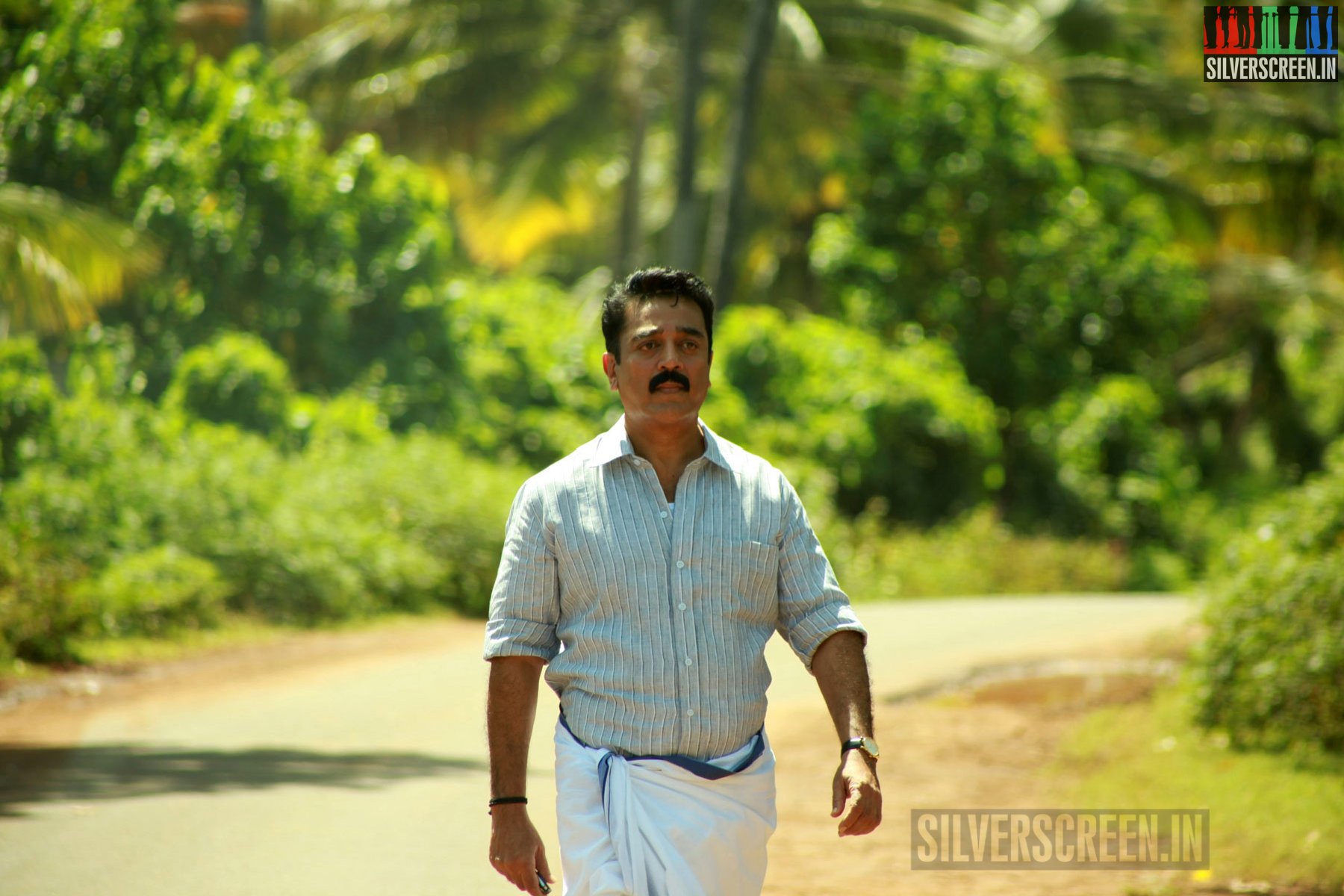Pa Ranjith has been on the phone for over an hour.
“Sorting out some issues,” his assistant tells me, as he hands me my third cup of coffee and wanders off to discuss Perumal Murugan’s ‘resurrection’. A group of young men, Harikrishnan (Johnny from Madras) among them, are waiting to lunch with the director. One of them has already decided what he wants to eat.
Biriyani saapte theeranum, he tells Harikrishnan.
I enter Ranjith’s office soon after. There’s a huge canister of coffee sitting on Ranjith’s glass-fronted table. Ranjith is on his fifth cup for the day.
Turns out, I’m not the only one with the caffeine addiction.
Before we can bond over it though, Ranjith gets a phone call. One in a series of many that would constantly interrupt our conversation that day. “Let’s get this clear,” he says forcefully into the phone. “Kabali is not about a low-class rowdy. I have never ever said that!”
The director has had to fend off many a rumour since he signed on to direct Kabali. “Either I’m asked if I’m killing off Rajini Sir’s character in the film, or if I’m going to include political commentary in it. I’ve not yet been able to decide which of these is worse.”
*****
Ranjith is breathing rarefied air. Barely three films in, he has directed Superstar Rajinikanth, one of the biggest stars in Indian cinema. Even better, he has managed to make a film with the Superstar. Not a ‘Superstar film’ – a distinction that is very important to him. “Early on, Soundarya Rajinikanth told me that it would be better if I were to inject some more comedy into the film, as Rajini sir felt the script was too raw. I flatly refused. It was a gutsy move, and a huge, huge risk. But I did it, because I wanted to be true to the script. I have been given this position as a director, and as a director of a film with a hero like Superstar sir for a reason. I can create change here, and I’m not willing to compromise.”
Kabali is Ranjith’s third Tamil film. It’s a strange place to be, he tells me. Pudhiyadhum illai, pazhaiyathum illai – Not new enough, not old enough. “It’s like fatherhood, in a way. With one-year-olds, you get to do crazy things. When the baby becomes two, you still get off scot-free if you’re not able to master parenthood. People understand. First and second films are about all the cool things you get to do, just like when your kids are under three. In Madras, there was still this feeling of joy, really at being able to do the one thing I’ve always wanted to do. With the third, Kabali, and with my hero, Superstar Rajinikanth, there is just so much responsibility riding on me. Nobody is going to understand if I fail at this.”
There’s fear, yes. Pa Ranjith finds himself thinking constantly about the audience. More so than he did with Madras. “I have to admit, I am a different man, a different director than I was when I did Madras. The day Rajini sir okayed my script, there was this feeling. For a brief time, I wondered what I’d gotten myself into. Very, very briefly. I didn’t have to wait long for common sense to kick in. This is Rajini, after all.”
His fear is justified. Since the project was announced last year, there has been a lot riding on Kabali. The last Rajinikanth film to really satisfy his core audience and make a lot of money (Rs. 300 crores gross, according to Sun Pictures’ year end report) for its producers was Endhiran.
Rajinikanth’s subsequent films – the live action Kochadaiiyaan and the disappointing Lingaa – were box-office failures that didn’t do justice to the actor’s standing in the industry. Consequently, expectations for Ranjith’s film are at an all-time high. “Madras did not have this craze. It’s all-consuming. I have people on the street telling me that I must make this film a hit. Fans and fan clubs waiting for my film. It’s daunting, this world that Rajini sir inhabits.”
*****
Santhosh Narayanan composes the music for Kabali. Close associates Dinesh and Kalaiarasan form an integral part of the acting team, supported by cinematographer G Murali. All of them had a single brief: Treat Kabali like any other film. Don’t let your awe of Rajinikanth stop you from doing your job. “All of us are die-hard fans of Superstar. So yes, the awe factor could potentially work against us. But this is a film, our livelihood. We must leave our personal likes and dislikes behind if we are to function properly. That is what I wanted.”
The way the audience have reacted to the film’s posters, trailers, and music have given him some peace. There is no Vairamuthu here, no SPB song, no Russian belly dancers to keep him company in a song – none of the usual Rajinikanth film sentiments have been accommodated. Instead, we have a Kabilan song – Ulagam Oruvanukka (‘Kalagam seidhu aandaiyarin kadhai mudippaan’) and that pulsating number Neruppu Da, a paean to Rajinikanth’s potent hold over the audience.
It also has Maya Nadhi, a beautiful melody about love that blossoms with age, which has the line ‘Thooyanarayilum Kadhal malarudhe’. Considering that his last release Lingaa had Rajini singing lines like ‘Paalannam Nee pasikkaaran naan‘ to a 27-year-old, this is a laudable departure from the norm. That said, Ranjith says there was no real intent to make Kabali as different as possible, “I am not running after everything new to make this film work. Anyone who knows me knows that I work best with people I know. I have retained almost ninety percent of Madras’ cast and crew. I have written the script about issues that interest me. There’s no compromise here. So how exactly is Kabali different? Is it different just because Rajini sir has had a makeover? Because the songs and lyrics are new? If appearance is everything, then the film will surely surprise a lot of people. But for me, it is normal. I have done the job I set out to do. That’s it.”
*****
Kabali is an unusual title, too. The name has negative connotations to it, something Ranjith had addressed in the film’s teaser. “Tamil Cinema has, to a certain extent, stereotyped Kabalis of the world. Often, we see a fat rowdy speaking North Madras slang as Kabali in our films. The Kabalis I’d known and met are not like that. This clichéd representation did not sit well with me, and I wanted to break it. That’s how I brought the name into the mix. I wanted to change how people viewed people named Kabali, and a big part of the change is fuelled by the fact that Superstar’s name in the film is this.”
There’s a certain confidence now, he admits, “Every right step towards the end of this particular journey has made me calmer. I am more geared for the final result now. Numbers don’t matter to me, I just want to make sure I do justice to this opportunity that I’ve been given. The day Madras released, I watched it in a local theatre. After seeing the audience’s response, I cried. They loved it and related to it so much. I want that and more with Kabali.”
*****
Growing up, Pa Ranjith feasted on Rajini films. Mullum Malarum had a particular impact on the filmmaker. “Kaali was this phenomenal character. He had this arrogance about him, this ego that dwarfed everything. I wanted Kabali to be like that. I wanted him to rise above his upbringing, his birth, and fulfill his destiny. It is the emotional journey of a man who has to make some tough choices for the sake of his people.”
There were instances when Superstar got the better of Rajinikanth, the man. “Here, image is everything. In Rajini sir, it is ingrained. He would talk fast, walk fast, act fast. It was too fast for me,” he laughs, “I would frequently caution him when this side of him came up. Most of my behaviour and direction had to do with the fact that I really desperately wanted to see Rajini, the actor. As he was in Mullum Malarum and KB sir’s films.”
*****
Ranjith loves writing strong women. For Madras, he came up with Kalaiarasi (Catherine Tresa), a feisty young woman who brings her man back from the brink of depression. For Kabali, it is Kumudhavalli (Radhika Apte), sporting Kanjeevarams, large gold pendants, and sad, sad eyes. “Women make men better, both onscreen and off. In films that are major star vehicles, I understand that it is tempting to sideline the women. And very wrong too. In Kabali, we have a man who aches for the woman who left him behind. In Madras, the separation was brief. Here, it is interminable.”
There’s also Dhanshika, with her startling new makeover, and Riythwika, whose role hasn’t yet been announced, “All the women in my film are independent and feisty. I feel the only way we can silence the wrong representation of women in popular culture is by flooding it with as many positive portrayals as possible. Maybe then these people will listen.”
I ask him about the prevalence of manic pixie dream girls in Tamil cinema. “I don’t understand the fascination either. Kannagi pirandha boomi idhu. How can we be okay then with representing women onscreen in such a lightweight, disrespectful manner? I have seen women who single-handedly managed families and small businesses. They’re a world away from the women we see in cinema.”
Women are catalysts for change, Ranjith says. “Women are the anchors of society and, as such, capable of cultural and societal change the level of which is just incomprehensible. I grew up with strong women, married a woman, and count many of them among my friends. How could I ever not include them in my films?”
*****
The idea behind Kabali’s story took root when Pa Ranjith was Assistant Director on Venkat Prabhu’s Goa. “I had gone to Lankavi to shoot scenes and I’d met so many of these people. Tamilians who had emigrated to the country a long time ago, people who were paid significantly less than natives of the country. This is a global issue. I felt that the story of the oppression taking place here would resonate with people.”
For Ranjith, capturing the plight of Malaysian Tamils accurately was of utmost importance. “I am portraying a sensitive issue here. While to a movie goer, this may be trivial, to the people I have spoken to, this is life or death. I hope that Kabali will start a conversation about how our people are oppressed in Malaysia and in several other countries. And so I made a conscious effort to keep everything as authentic as possible. Rajini sir plays a Malaysian citizen in the movie and he speaks a lot of Malay too.”
Stories of Tamilians and their struggles are still hard to find in our cinema, says Ranjith, “We have a lot of filmmakers who make films based on issues that are real to the common man. But they are overshadowed by boy-meets-girl stories, village action films and so on. There are so many stories out there. I travelled to Malaysia and came back with an idea for a film about the plight of the Malaysian Tamil people. Closer home, we have Tamilians who face problems in Sri Lanka, the Gulf, Singapore, even in Mumbai. Why do we go to these places to shoot songs only? Why can’t we make cinema about their problems?”
Recommended
It is important now, Ranjith insists, that directors shine the spotlight on social issues. “As artists, we must all strive to change what we show onscreen. Films cannot change people, if they’d had that power, our society would be perfect now. But films are a powerful tool. They can provoke people into thinking, and that is enough. If we can make a person take time off from his smartphone to think about something, that is enough.”
*****
Insistent ringing from his phone brings an end to our conversation. Ranjith sips his seventh cup of coffee. As I’m escorted outside, I hear his fading voice say a little less forcefully, “No sir, I never said Kabali is about a low-class rowdy. I never said that ever.”
Another interviewer walks in, clutching a steaming cup of coffee. The phone rings again. And so it continues.
*****



